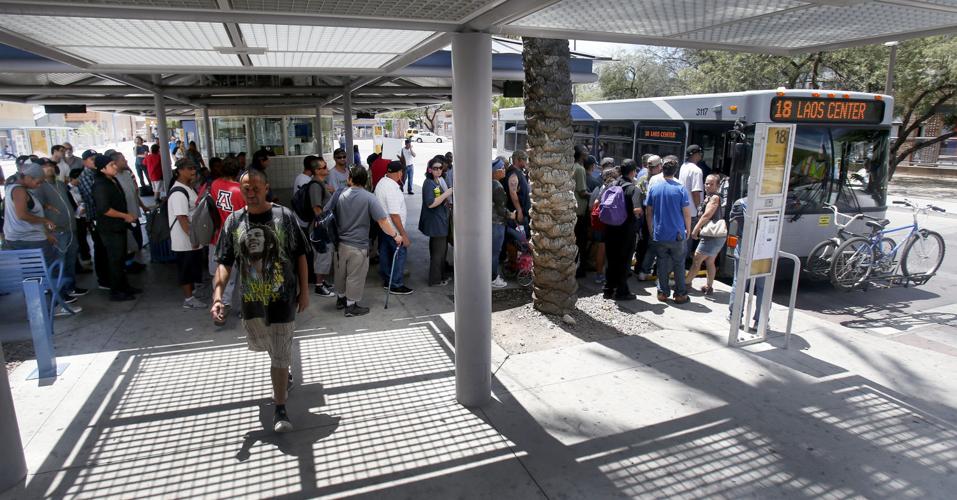You can’t blame the bus strike entirely on Professional Transit Management, the private company that operates the Sun Tran system.
The Teamsters’ initial proposal was unrealistically rich, considering the financial situation of the city of Tucson, which provides most of the system’s funding.
But the Teamsters have dialed back that initial proposal, which the company priced at $21 million over three years. Last week the union made another proposal that the company estimates would cost $11 million over three years.
The company’s counter-offer? Since before the strike, there hasn’t been one. That’s a problem.
It’s been an exceptionally tough two weeks for thousands of bus riders in the Tucson area, not to mention hundreds of striking workers and their families. At the same time bus service was reduced to a skeleton schedule, the heat soared to excruciating levels, making walking any distance impossible at some times of the day. It’s a ridiculous situation, one that should make us all think about ways to avoid it in the future.
The solution I’m looking for is a way to dump the company — not because the strike is entirely its fault, but because its existence both gets in the way of a resolution and is a sign of a faulty system. As I wrote last week, Tucson’s transit system is built on complicated relationships between the city, Professional Transit Management, the Teamsters and other entities such as the Regional Transit Authority.
When it comes to the labor relationship, this setup is untenable because it means the city sets the budget and pays the company most of the money for operating the buses, but the city can’t by law be involved in labor negotiations. The current contract with Professional Transit Management runs until April 2016, with options for the city to renew up to four more years.
The only reason a third-party private company runs the system, remember, is in order to get federal funding. The city charter forbids city workers from striking.
A simpler arrangement would be for the people who pay for the system to run the system. Cut out the third party altogether and let the people with the money do the negotiation.
Council Member Karin Uhlich is trying to restart consideration of a regional transit entity, a board that would operate all aspects of transit. Don’t confuse it with the Regional Transportation Authority, which already exists. It could be a new thing, or it could be incorporated with the existing somehow.
“That board could provide a more direct voice for the funders of the system, not only to deal with labor but to shape the system,” Uhlich said.
This idea has come up before. The former director of the Regional Transportation Authority, Gary Hayes, tried to essentially fold operation of transit into the authority back in 2010 before being rebuffed by the Tucson City Council. Council members viewed him as trying to take the city’s money and run the system without them having significant representation.
But Hayes is gone, replaced by Farhad Moghimi, and the idea of establishing a regional transit entity is gaining some traction again, thanks in part to the 16-day strike.
Mayor Jonathan Rothschild wants to pursue it, too. He’s thinking about the idea of paying for this authority with an additional one-quarter cent county-wide sales tax. We already pay a half-cent toward the Regional Transportation Authority.
“The environment is more conducive to looking at regional transit,” he said, comparing now with 2010. “There’s more desire for regional coordination of transit, and on the city’s part there’s more confidence in that.”
Council member Steve Kozachik also supports looking at the idea, though he said labor will have to be willing to work within the budget no matter who runs the system.
Moghimi’s presence at the head of RTA is one of the reasons for the increased confidence. He told me that he views any additional sales tax for transit as supplementary to what the city of Tucson and other entities already put into transit.
That makes governance issues complicated, as everyone involved acknowledges. If the city of Tucson puts in the bulk of the money, it’s going to want the bulk of the representation on the board that runs the system.
But that shouldn’t be an insurmountable challenge. And this unending strike shows that we need to try.
THE WINNER IS ...
Ideas keep rolling in for Arizona’s new slogan.
After my column Wednesday, readers sent in about 60 sarcastic or funny entries, and about 24 serious ones. I got entries from about 35 people, some of whom sent in many after their brainstorming reached an overflowing boil.
Here are a few of my favorite facetious ones:
“Free ice cream with proof of citizenship” — from John Yoakum
“Arizona: 49th in education but furst in your hart” — from Robbie Sherwood
Many readers tried to play off the state’s nickname, the Grand Canyon State. Of those, my favorites were:
“Grand, canyon state” — from Douglas Adamson
“Everything’s grand in Arizona” — from Laura Penny
My favorite came from Facebook friend John Forrey, whom some of you may know as a Bisbee photographer. He didn’t even realize he was submitting to a contest when he posted the idea. It helped that he put his slogan on one of his original photos of a shaft of monsoon rain at sunset. The slogan:
“Arizona: AZ good AZ it gets”





